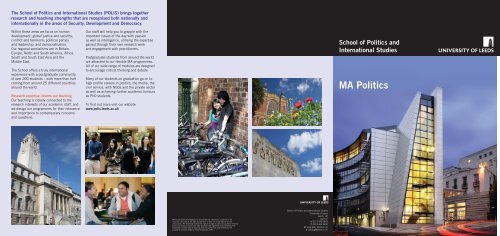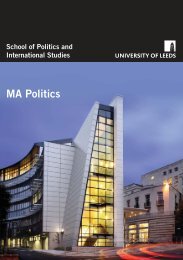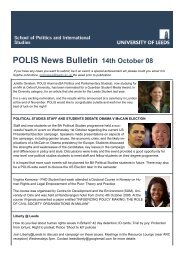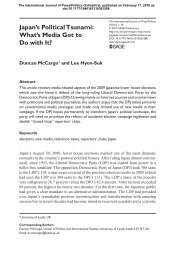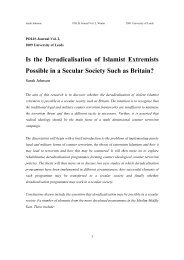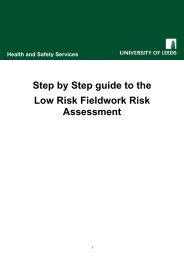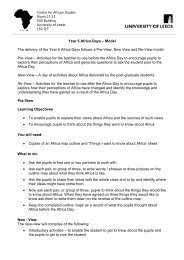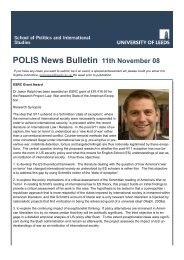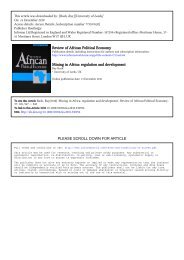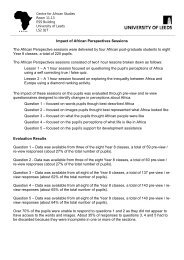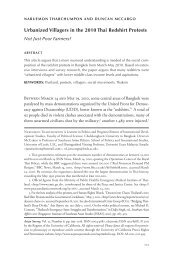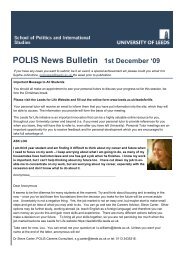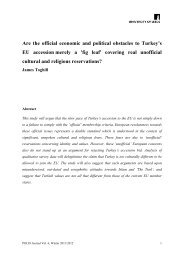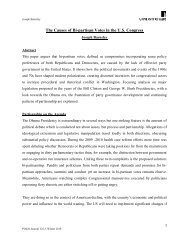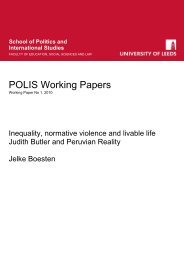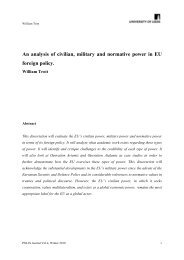MA Politics - School of Politics International Studies - University of ...
MA Politics - School of Politics International Studies - University of ...
MA Politics - School of Politics International Studies - University of ...
Create successful ePaper yourself
Turn your PDF publications into a flip-book with our unique Google optimized e-Paper software.
The <strong>School</strong> <strong>of</strong> <strong>Politics</strong> and <strong>International</strong> <strong>Studies</strong> (POLIS) brings together<br />
research and teaching strengths that are recognised both nationally and<br />
internationally in the areas <strong>of</strong> Security, Development and Democracy.<br />
Within these areas we focus on human<br />
development; global justice and security;<br />
conflict and terrorism; political parties<br />
and leadership; and democratisation.<br />
Our regional specialisms are in Britain,<br />
Europe, North and South America, Africa,<br />
South and South East Asia and the<br />
Middle East.<br />
The <strong>School</strong> <strong>of</strong>fers a truly international<br />
experience with a postgraduate community<br />
<strong>of</strong> over 200 students – with more than half<br />
coming from around 25 different countries<br />
around the world.<br />
Research expertise informs our teaching<br />
Our teaching is closely connected to the<br />
research interests <strong>of</strong> our academic staff, and<br />
we design our programmes for their relevance<br />
and importance to contemporary concerns<br />
and questions.<br />
Our staff will help you to grapple with the<br />
important issues <strong>of</strong> the day with passion<br />
as well as intelligence, utilising the expertise<br />
gained through their own research work<br />
and engagement with practitioners.<br />
Postgraduate students from around the world<br />
are attracted to our flexible <strong>MA</strong> programmes.<br />
All <strong>of</strong> our wide range <strong>of</strong> modules are designed<br />
to encourage critical thinking and debate.<br />
Many <strong>of</strong> our students on graduation go on to<br />
high pr<strong>of</strong>ile careers in politics, the media, the<br />
civil service, with NGOs and the private sector<br />
as well as achieving further academic honours<br />
as PhD students.<br />
To find out more visit our website<br />
www.polis.leeds.ac.uk<br />
<strong>School</strong> <strong>of</strong> <strong>Politics</strong> and<br />
<strong>International</strong> <strong>Studies</strong><br />
<strong>MA</strong> <strong>Politics</strong><br />
Whilst the <strong>University</strong> endeavours to ensure that the information contained in this<br />
brochure is accurate at the date <strong>of</strong> publication it does not accept liability for any<br />
inaccuracies. The <strong>University</strong> reserves the right to change or cancel its courses or services<br />
at any time without liability even after students have registered at the <strong>University</strong>. The<br />
<strong>University</strong>’s contract with its students does not confer third party benefits for the<br />
purpose <strong>of</strong> Contracts (Right <strong>of</strong> Third Parties) Act 1999.<br />
<strong>School</strong> <strong>of</strong> <strong>Politics</strong> and <strong>International</strong> <strong>Studies</strong><br />
<strong>University</strong> <strong>of</strong> Leeds<br />
Leeds, UK<br />
LS2 9JT<br />
t: 0113 343 6843<br />
f: 0113 343 4400<br />
w: www.polis.leeds.ac.uk<br />
e: polispg@leeds.ac.uk
<strong>MA</strong> <strong>Politics</strong><br />
The first decade <strong>of</strong> the twenty-first century<br />
has witnessed a dramatic transformation <strong>of</strong><br />
the political landscape <strong>of</strong> our world.<br />
The rise <strong>of</strong> international terrorism, the global<br />
financial crisis, deepening anxiety over the<br />
environment, new patterns <strong>of</strong> migration and<br />
associated fears <strong>of</strong> social and cultural<br />
fragmentation have all significantly altered<br />
political priorities.<br />
The <strong>MA</strong> <strong>Politics</strong> programme <strong>of</strong>fers a unique<br />
approach to the study <strong>of</strong> politics by drawing<br />
on and integrating the breadth <strong>of</strong> research<br />
expertise in the <strong>School</strong>. This enables us to<br />
<strong>of</strong>fer an unusually broad range <strong>of</strong> modules<br />
alongside the opportunity for students to<br />
construct a personalised programme <strong>of</strong> study<br />
that allows in-depth concentration and<br />
specialisation in areas <strong>of</strong> interest.<br />
The programme will provide you with a firm<br />
grounding in political analysis and a critical<br />
insight into the real politics behind the<br />
headlines. You will gain first-hand experience<br />
<strong>of</strong> participation in a community <strong>of</strong> researchactive<br />
scholars and you will develop<br />
outstanding skills in research, team-working<br />
and presentation.<br />
Our innovative, research-based pathways and<br />
modules provide students with the<br />
opportunity to work in collaboration with<br />
research-active academics and to contribute<br />
meaningfully to our lively research culture.<br />
Tailor your programme<br />
As an <strong>MA</strong> <strong>Politics</strong> student, you will take a<br />
core module in Advanced Political Analysis,<br />
which concentrates on the development <strong>of</strong><br />
analytical and research skills in the study <strong>of</strong><br />
politics and which examines key concepts<br />
such as power and the political. From there<br />
you will specialise by selecting from a broad<br />
range <strong>of</strong> optional modules.<br />
You may also choose to tailor your degree to<br />
suit your specific interests by pursuing one<br />
<strong>of</strong> our specialist pathways in Political Theory<br />
or Parliamentary <strong>Studies</strong>. The Parliamentary<br />
pathway includes a semester-long internship<br />
with a Member <strong>of</strong> Parliament. During the<br />
internship, you will engage with the full<br />
range <strong>of</strong> administrative and research work<br />
undertaken – usually in an MP’s <strong>of</strong>fice in<br />
Westminster<br />
<strong>MA</strong> <strong>Politics</strong> provides an excellent grounding<br />
for those seeking to launch careers in a<br />
range <strong>of</strong> related areas such as politics, the<br />
media, the civil service, NGOs, trades<br />
unions and academia. It is ideally suited to<br />
students wishing to develop the skills<br />
necessary to pursue a PhD in politics.<br />
The <strong>Politics</strong> Programme<br />
The <strong>MA</strong> in <strong>Politics</strong> is a 12 month full time<br />
degree. It can also be taken part-time over<br />
24 months (except for the Parliamentary<br />
pathway). Our <strong>MA</strong> programmes begin in<br />
late September.<br />
<strong>MA</strong> <strong>Politics</strong><br />
The <strong>MA</strong> in <strong>Politics</strong> is a flexible, crossdisciplinary<br />
programme that combines core<br />
modules with a wide range <strong>of</strong> optional<br />
modules.<br />
Core modules:<br />
● Advanced Political Analysis (30 credits)<br />
● 12,000 word dissertation (60 credits)<br />
Optional modules<br />
To complete a total <strong>of</strong> 180 credits, students<br />
choose 90 credits worth <strong>of</strong> modules from the<br />
<strong>MA</strong> <strong>Politics</strong> options listed opposite.<br />
<strong>MA</strong> <strong>Politics</strong> Pathways<br />
Students taking the <strong>MA</strong> in <strong>Politics</strong> have the<br />
option to specialise in one <strong>of</strong> two pathways:<br />
Parliamentary or Political Theory.<br />
The pathways reflect the particular research<br />
strengths in politics <strong>of</strong> the <strong>School</strong> and will be<br />
stated on the degree certificate on graduation.<br />
Each pathway contains its own additional<br />
core modules.<br />
<strong>MA</strong> <strong>Politics</strong> (Parliamentary)<br />
● Advanced Political Analysis (30 credits)<br />
● Parliamentary <strong>Studies</strong> 1 (30 credits)<br />
● Parliamentary <strong>Studies</strong> 2 – Internship<br />
(60 credits)<br />
● 12,000 word dissertation (60 credits)<br />
<strong>MA</strong> <strong>Politics</strong> (Political Theory)<br />
● Advanced Political Analysis (30 credits)<br />
● Concepts and Issues in Political Theory<br />
(30 credits)<br />
● 12,000 word dissertation (60 credits)<br />
Plus 30 credits from the following options<br />
(subject to availability):<br />
● Debates about the Just Society<br />
(30 credits) ● <strong>Politics</strong> and Morality (30 credits)<br />
● Democratic Theory and Political<br />
Transformation (30 credits)<br />
● Relations <strong>of</strong> Theory to Practice (30 credits)<br />
Plus 30 credits from the options listed.<br />
Optional modules list for <strong>MA</strong> <strong>Politics</strong><br />
● Concepts and Issues in Political Theory<br />
(30 credits)<br />
● Conflict, Complex Emergencies and Global<br />
Governance (30 credits)<br />
● Contemporary <strong>International</strong> Security<br />
(15 credits)<br />
● Debates about the Just Society<br />
(30 credits)<br />
● Democracy and Development (30 credits)<br />
● Democratic Theory and Political<br />
Transformation (30 credits)<br />
● Democratisation and Multi-Party <strong>Politics</strong> in<br />
Africa (30 credits)<br />
● Developments in British <strong>Politics</strong><br />
(30 credits)<br />
● Environmental <strong>Politics</strong> and Policy<br />
(30 credits)<br />
● EU and the Developing World (30 credits)<br />
● <strong>International</strong> Political Economy<br />
(30 credits)<br />
● <strong>International</strong> <strong>Politics</strong> and the Environment<br />
(15 credits)<br />
● Making <strong>of</strong> Modern Europe (30 credits)<br />
● Parliamentary <strong>Studies</strong> 1 (30 credits)<br />
● Policing Post-Conflict Cities (15 credits)<br />
● Political Economy <strong>of</strong> Resources and<br />
Development (30 credits)<br />
● Political Transitions in South East Asia<br />
(30 credits)<br />
● <strong>Politics</strong> and Morality (30 credits)<br />
● <strong>Politics</strong> <strong>of</strong> Intelligence (15 credits)<br />
● <strong>Politics</strong> <strong>of</strong> the European Union (30 credits)<br />
● <strong>Politics</strong> <strong>of</strong> Trade and Industrial Policy<br />
(30 credits)<br />
● Relations <strong>of</strong> Theory to Practice (30 credits)<br />
● Thatcherism and New Labour (30 credits)<br />
● World <strong>Politics</strong> and the Environment<br />
(15 credits)<br />
Applicants should note that the availability <strong>of</strong><br />
optional modules varies from year to year.


